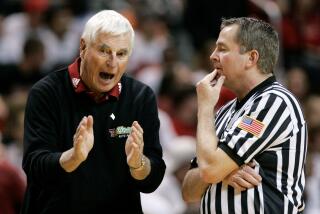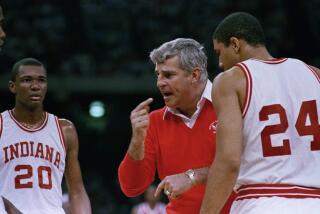Indiana Coach Knight Benched for Good
- Share via
Less than four months after giving Bob Knight one “last chance” to save his storied but turbulent career, Indiana University’s president fired the 59-year-old basketball coach Sunday for violating the terms of a “zero-tolerance” conduct policy that the university chief instituted in May.
President Myles Brand’s decision, announced at a Bloomington news conference that Knight did not attend, came in the wake of a 19-year-old freshman’s accusation that Knight grabbed his arm and verbally accosted him last week on the Indiana campus, a charge Knight vehemently denied.
Brand said the incident involving the freshman, still under investigation by university police, was only the latest in a series of intolerable acts that led to Knight’s dismissal.
“This persistent pattern of troubling behavior has led me to only one conclusion,” Brand said.
Late Sunday night, after meeting with his players, Knight addressed the throngs of students who had been gathered at the university for hours.
“In the next couple days, I’m going to get together somewhere with as many students who want to come out, and then I’m going to tell you my side of this thing,” Knight told the crowd, which responded with cheers. “And I think you’ll be interested in hearing it.” For 29 years, Knight ruled Indiana basketball with an iron fist and a hair-trigger temper.
His career is rife with contradictions. Knight’s Hoosiers won the national collegiate championships in 1976, 1981 and 1987 with a precise, disciplined style of play that revolutionized the modern game. He demanded excellence from his players, on and off the court, and Indiana has never under Knight received major NCAA sanctions.
Yet, Knight himself was often out of control. In a basketball-crazed state, however, his foibles were generally accepted as part of the bargain that beget supremacy.
With 763 victories, Knight is only 117 shy of breaking the career victories record of North Carolina’s Dean Smith. But at a time when a man with his standing should be basking in reflective glory, Knight’s career took an ominous turn in March when a former Hoosier player told CNN/Sports Illustrated that Knight had choked him during a 1997 practice.
Despite the story’s ongoing momentum, Sunday’s news jarred Indiana and the sporting community.
Murray Sperber, a former Indiana English professor and one of Knight’s most vocal critics, said the decision was long overdue.
“Knight brought lots of positives to IU, but the negatives far outweigh the positives,” said Sperber, who moved to Montreal this spring after receiving death threats in wake of his Knight criticisms. “It was just important for the institution to move on. The next time IU is on CNN, I hope it’s for an educational reason and not for a Bob Knight incident.”
Knight’s Firing ‘Most Divisive Event’
Pete Newell, the legendary former University of California coach and one of Knight’s closest friends, called the firing farcical and claimed there would be lasting repercussions. “It will be the most divisive event that ever happened at the school,” Newell said.
It may already be. Sunday in Bloomington, protesters burned Knight’s latest accuser, freshman Kent Harvey, in effigy outside Brand’s home, while fliers were circulated with a picture of Harvey and the message: “Wanted: Dead.”
In a Sunday morning phone call, Brand said he offered Knight the chance to resign. When Knight refused, Brand fired him.
“Unquestionably, this is the most difficult decision I’ve ever had to make,” Brand said. “Bob Knight is a legendary coach at a school with a legendary basketball program.”
Brand said the university will pay Knight the balance of his contract, approximately $170,000 a season, through June 2002.
A yet-to-be-named interim coach will lead the Hoosiers this season while a national search for Knight’s successor is conducted.
Knight’s “last chance” came after a videotape of a 1997 incident, leaked to the media, aired this spring. It appeared to support former Hoosier player Neil Reed’s allegations that Knight choked him.
Brand ordered the school’s nine-man Board of Trustees to investigate the Reed incident. In May, the trustees reported to Brand that Knight, through the years, had “illustrated a protracted and often troubling pattern in which Coach Knight has a problem of controlling his anger.”
This was not bulletin-board news to those who have followed the career of a coach who, in 1979, was arrested in absentia after assaulting an officer in Puerto Rico, tossed a chair across the court during a 1985 game against Purdue, kicked his own son during a game, head-butted a Hoosier player and routinely accosted reporters, referees and co-workers.
The Reed incident, however, crystallized the seriousness of Knight’s behavior to Brand, who appeared on the verge of firing Knight in May before the coach made an impassioned plea to keep his job. In a public statement, Knight apologized for his anger problems and vowed to keep his temper in check.
Instead of firing Knight, Brand suspended him for the first three games this season, fined him $30,000 and issued a “zero-tolerance” edict stipulating that “any verified, inappropriate physical contact with players, members of the university community or others in connection with the coach’s employment at IU will be the cause for immediate termination.”
Knight agreed to the terms, but Brand said Sunday that the coach has persistently “violated the letter and the spirit of the guideline set out on May 15.”
In the 17 weeks since, Knight has “behaved and acted in a way that is both defiant and hostile,” Brand said. He said Knight has refused to work within the normal chain of command, has made “angry and inflammatory remarks about university officials and the Board of Trustees” and “verbally abused a high-ranking female university official.”
Knight Long on Road to Termination Brand said he asked Knight to cancel a fishing trip to Canada this weekend and remain in Bloomington to address the latest allegations, but Knight refused.
Brand said Knight was on the road to termination long before the IU student’s claims.
On their own, Harvey’s allegations are suspicious because the student is the stepson of Mark Shaw, a former Bloomington talk show host who has been critical of Knight.
But Brand also said that, after talking with police, there is no disputing that Knight grabbed the student’s arm.
“In the end, Bob Knight’s attitude was just no longer tolerable,” Indiana Trustee Ray Richardson said.
But Indiana player Jared Jeffries said, “Coach Knight wasn’t given a fair chance in this.” And Michigan State Coach Tom Izzo said, “In this latest situation, I smell a rat.”
Knight maintains he made only harmless physical contact as he lectured Harvey for addressing him as “Knight,” instead of “Mr. Knight” or “Coach Knight.”
Brand says the contact alone violated the terms of zero tolerance.
“While the stepfather of the young man has aggressively sought media coverage of the event, and that is unfortunate, we are committed to assuring every IU student has the right to a safe, productive and enlightening educational experience,” Brand said.
Newell said Sunday that he smelled a setup. “It was just a question of time before he was trapped into something,” Newell said. “Some people were willing to get their name in the paper to trap him.”
Former UC coach Newell says he believes Knight will coach again. “I don’t think he’ll go out like this,” Newell said.
But instead of pursuing Smith’s hallowed victories mark at Indiana, Knight joins former Ohio State football coach Woody Hayes and former Arizona State football coach Frank Kush as great coaches who will be remembered for less-than-honorable parting acts.
Hayes was fired after he struck a Clemson player in the 1978 Gator Bowl. Kush was forced out after a sideline incident in which he struck his own punter.
Newell insists Knight deserved better. “What Woody did was unfortunate, and unpardonable,” Newell said. “But this thing, God almighty, this could happen anywhere. I guess this is what zero tolerance is all about.”
*
The Associated Press contributed to this story.
More to Read
Go beyond the scoreboard
Get the latest on L.A.'s teams in the daily Sports Report newsletter.
You may occasionally receive promotional content from the Los Angeles Times.











